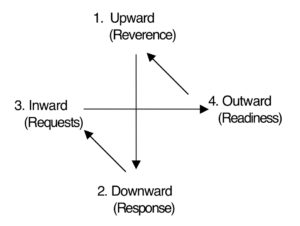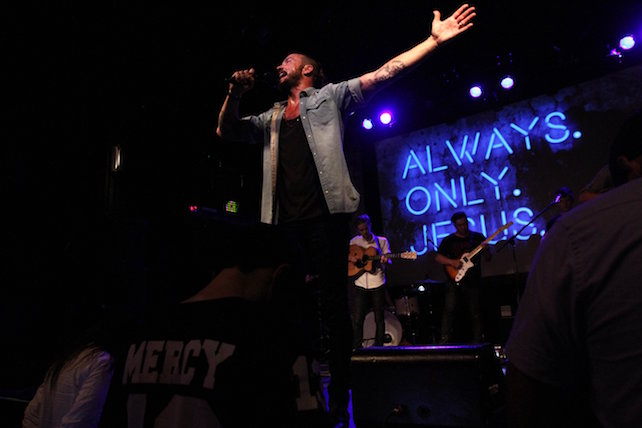In our information age, complexity abounds. Noise pollutes our yearning for spiritual equilibrium and simplicity. E-mails, text messages, tweets, and Facebook clutter our lives with more than we can possibly digest in any given day. Clear answers are often buried in a sea of tangential information and advertising, found in books, magazines, the internet, or the media.
Perhaps that is why the For Dummies series is one of the strongest and most instantly identifiable brands in publishing. On their website, the company describes their success: “With more than 200 million books in print and more than 1,600 titles, For Dummies is the most widely recognized and highly regarded reference series in the world. Since 1991, For Dummies has helped millions make everything easier . . . presenting even the most complex subjects in plain English.”[i] The subtitle of the books reads, “A Reference Guide for the Rest of Us.”
The Core of Prayer
Concerning the Lord’s Prayer, John MacArthur writes, “One of the marvels of the infinite mind of God is His ability to speak of vast themes in a few words . . . No set of volumes, no exhaustive themes of great length, no series of teaching or preaching offered by men could ever have captured the fullness of what prayer is, and is to be, as does that profoundly simple model. It sets the standard for all praying. It encompasses all elements in prayer. It’s for you, to change your prayer—and more, to change your life.”[ii]
The “Lord’s Prayer,” as we are accustomed to calling it, really is the ultimate pattern of prayer Jesus gave to His disciples. He repeated it twice in the gospels. The first delivery (Matthew 6) occurred near Galilee before a large crowd in the context of an extended sermon. His second iteration (Luke 11) occurred near Jerusalem after the disciples observed Him in prayer. He repeated this specific pattern after they made a request to learn how to pray. In the original Greek, Jesus’ admonition to “pray this way” was a “present imperative” which makes this a command that we are to always and continually obey. Jesus was serious about our need to learn to pray according to this pattern.
Simple and Applicable
In recent years I have discovered a very simple way to understand and implement this incredible prayer. I call it the “For Dummies” version because is it so simple and immediately applicable—and memorable. It has become a standard approach for my personal prayers. Every time I look at a biblical text as a springboard to prayer, I think in terms of this pattern. It is almost as if this diagram is engraved on my bifocals.
I have also taught this pattern to thousands of pastors, prayer leaders, and church members. In my books PRAYzing!, Transforming Prayer, Old Paths, New Power, and How to Pray in a Crisis, I also explain this pattern. I hope it helps you experience new clarity in your personal prayer life. This is a worship-based approach to seeking God’s face in order to then trust Him for the vital issues of your journey.
The 4/4 Pattern
I grew up with a love for music. I played a couple instruments, sang in high-school all-state choirs, and received a scholarship for vocal music for two of my four years of college. So, it was natural that I experienced a convergence between my love for the Lord’s Prayer and my love for music. The result is what I call the “4/4 Pattern” of prayer.
In music, the 4/4 pattern is the most basic beat. In adapting the elements of that pattern to the Lord’s Prayer, it looks like this:

As you think about this pattern, keep in mind that our prayers begin in the Scriptures. So I always start with an open Bible. Very often I use a Psalm—but really any text of God’s word can initiate our praying, using this pattern. We also know that our teacher is the Holy Spirit. We come to the text with a ready mind, but also with a heart entirely surrendered to the instruction of the Holy Spirit as we pray.
THE STARTING PLACE: REVERENCE
Imagine a conductor before an orchestra. The conductor raises a hand and fixes it high to capture the attention of the musicians. Every member is at full attention. In the prayer pattern Jesus gave His disciples, He instructs us to begin with this upward focus of worship (“Our Father in heaven, hallowed be Your name”). We call this upward focus or reverence. In keeping with Jesus’ instructions, prayer begins with the character of God as we take time to focus on the wonders of who God is according to His word.
As our “Father,” He is caring and intimate. As the One who is in “heaven” He is transcendent, holy, and separate. Striking this perfect balance, Jesus teaches us to draw near with assurance and awe, in heartfelt intimacy and holy imagination, in Abba adoration based on His glorious name.
Speaking of the priority of this first element of prayer, one writer says that this focus “calls for us to think about God, and in particular his Name. Our prayers are to be suffused with large thoughts about God. We are to take the attributes of God, which are suggested by his various names. If our prayers are not focused on God we are guilty of ‘idolatry’ as we are putting someone (or something) else in God’s place.”[iii]
A.W. Tozer said it famously: “What comes to mind when we think about God is the most important thing about us . . . and the most portentous fact about any man is not what he at a given time may say or do, but what he in his deep heart conceives God to be like.”[iv] Spending quality time with an opened Bible, delighting in the names and character of God, is the most important engagement in our lives and the vital starting point of prayer. This rivets our entire being on His name, and sets our hearts on His glory as the goal of all prayer. This allows us to abide in Him as His word abides in us. This brings us into conformity to the Lord Jesus so that we truly pray “in His name.”
Not only is our reverence a springboard to intimate, biblical, extended worship but it is vital to the exercise of real faith in prayer. Hebrews 11:6 says, “But without faith it is impossible to please Him, for he who comes to God must believe that He is, and that He is a rewarder of those who diligently seek Him.” Consider that all our praying may not please God if we do not pray in the faith that comes from the Word of God (Romans 10:17). This “upward” start puts our hearts in full attention and awe of who God is, and assures us of His character and commitment to reward us as we set our hearts to seek Him, not just things from Him.
THE DOWNWARD STROKE: RESPONSE
Next, the musical conductor gives the downbeat and the composition begins. In this prayer pattern, our “music” of worship and praise has already commenced. Now we respond to God’s character. Jesus taught the essence of this when He said, “Your kingdom come. Your will be done on earth as it is in heaven.” This response to God’s character in prayer involves yielding to the control of the Holy Spirit and recommitting to God’s kingdom purposes. Introspection and surrender mark this time of yielding to the Spirit’s promptings. It is a season of pledged obedience to the will and word of God, desiring the accomplishment of His purposes in our lives.
Scottish writer Robert Law said, “Prayer is a mighty instrument, not for getting man’s will done in heaven, but for getting God’s will done on earth.”[i] Warren Wiersbe explains that this moment of prayer involves “the devotion and dedication of our entire being to Jesus as we eagerly anticipate seeing him.”[vi] It involves praying with the obedience and surrender to Jesus who said, “Not my will but Yours be done” (Luke 22:42), for the sake of the Father’s glory and kingdom purposes.
THE INWARD STROKE: REQUESTS
From the downbeat, the conductor now moves the baton, slanting upward and left, setting the tempo for the music. In prayer, we are now ready to express trust in God for the needs of our lives by way of our requests. I often say that we do not really know what to ask for until we have worshiped well and surrendered completely. Psalm 9:10 says, “Those who know your name will put their trust in You.” From this position of spiritual alignment, we come to the Father with our requests.
“Give us this day our daily bread, and forgive us our debts, as we forgive our debtors” invites us to pray about the resource and relationship issues of life. If we looked at the average prayer list, virtually every request would ultimately be a resource concern or a relationship concern. Jesus, in His divine wisdom, knew our journey and our struggles. This segment of trusting Him with a variety of “inward” matters allows us to lay it all out before Him.
Praying about “daily bread” is more than hoping we can scrape some funds together to buy a fresh bagel at Panera. This idea represents “all that we need to sustain life as we serve the Lord.”[vii] This is not a time of informing God of our needs, because He knows what we need before we ask (Matthew 6:8). Rather, this is an expression of conscious trust in God as the perfect definer and provider of our needs. It involves prayer about personal concerns, family and friends, daily circumstances, and even ministry matters.
Relationships matter to God. As the word and Spirit are working in us, leading us into prayer “according to the will of God” (Romans 8:27), we will be compelled to evaluate our relationships to be sure that our conscience is clear and relationships are right (Acts 24:16). We come to a place of relational alignment in this moment of prayer. This requires our confession of any sin that is revealed, leading to confession and restoration—both vertically (with the Lord) and horizontally (with others). Christians are a forgiven and forgiving people.
This element of the prayer addresses the inward realities of our heart to align us with the heart of the One who is the God of self-sacrificing, gracious, merciful, and forgiving love.
THE OUTWARD STROKE: READINESS
As the music continues, the conductor moves the beat to the right, keeping tempo. As our prayer continues, the outward stroke reminds us of the spiritual contest before us and, more importantly, reassures us of the spiritual resources within us. We know the time comes when we must get off our knees and re-enter the warfare zone. We must be battle ready.
When we pray, “Do not lead us into temptation, but deliver us from the evil one,” we recognize our own inability to overcome the temptations and snares of daily life. We entrust our welfare for the warfare to the One who is our victor. Borrowing from the great spiritual combat text of Ephesians 6:10–20, we prepare or hearts and minds to “be strong in the Lord and in the power of His might” as we “put on the whole armor of God . . . to stand against the wiles of the devil” (v. 10–11). In this moment of readiness for the battle, we affirm that “we do not wrestle against flesh and blood, but against principalities, against powers, against the rulers of the darkness of this age, against spiritual hosts of wickedness in the heavenly places” (v. 12).
We are praying to be battle ready through our trust in Christ. He is able to “make a way of escape” (1 Corinthians 10:13) and His word is sufficient to equip us in the face of any temptation (see the example of Jesus in Matthew 4:2–11).
I often say, “The comfort zone is the danger zone.” As we come to the concluding moments of a prayer time, we not only anticipate but also embrace the responsibility to “fight the good fight.” We are called to be praying menaces to the devil. Prayer is not an escape from the battles of life but a great equipping to fight them in supernatural power. The very fact that we are seeking God’s face and engaging in life-giving prayer alerts the enemy to our increased threat to his dominion. When we pray, we pick a fight with the devil at a completely new level.
Yet, this is why we are on earth—not to cruise along on a luxury liner until Jesus comes but to stay actively engaged in our “search and rescue mission” in the midst of the global spiritual battle for the hearts and minds of people.
As you learn to obey Jesus in your prayer life, everything will change. I trust this simple approach will spark personal transformation and a new enthusiasm to seek His face in your family, church, and community.
(This article was adapted from Daniel Henderson’s popular book, Transforming Prayer: How Everything Changes When You Seek God’s Face.)
Copyright © 2021 Daniel Henderson. All rights reserved.
——————————————————————————-
[i] http://www.dummies.com/about-for-dummies.html
[ii] John MacArthur, Jesus’ Pattern of Prayer (Chicago: Moody Press, 1981), 10
[iii] Derek Thomas, Praying the Saviour’s Way (Ross-shier, Great Britain: Christian Focus Publications, 2002), 43
[iv] A.W. Tozer, The Knowledge of the Holy, (San Francisco: Harper-San Francisco, 1992), 1
[v] Robert Law, The Tests of Life (Edinburg: T & T Clark, 1909) 304
[vi] Warren Wiersbe, : On Earth as It Is in Heaven—How the Lord’s Prayer Teaches Us to Pray More Effectively (Grand Rapids: Baker, 2010), 68
[vii] Ibid, 91
This article originally appeared here.

















